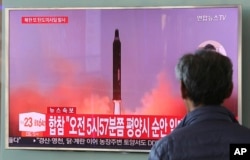The U.S. president and his defense secretary issued divergent comments Wednesday about how to respond to North Korea's advancing ballistic missile and nuclear weapons programs.
Defense Secretary Jim Mattis emphasized that the United States is "never out of diplomatic solutions" in dealing with North Korea. That comment was made after President Donald Trump said that "talking is not the answer."
Mattis was responding to a question about Trump's tweet Wednesday morning on dealing with the threat of North Korea following its most recent ballistic missile test, in which a projectile flew high over Japan.
"Talking is not the answer!" Trump tweeted, a day after he said that "all options are on the table" for dealing with Pyongyang.
Some analysts are criticizing the divergence.
"Aside from the fact that President Trump needs to get his facts straight — talking has worked at times and not at others — his administration needs to get its policies straight," Joel Wit, senior fellow at the U.S.-Korea Institute at the Johns Hopkins University, told VOA.
The Trump administration's "constant stream of contradictory statements is only confusing our allies and undermining our ability to effectively deal with this growing threat," said Wit, who coordinated a U.S. deal with North Korea in the mid-1990s to freeze its nuclear program.
An arms control specialist who worked in the Clinton and Obama administrations, Gary Samore, said, "Trump is correct that our efforts to negotiate agreements with North Korea to resolve the problem, to end the North Korea nuclear program, haven't worked."
Samore, of the Belfer Center for Science and International Affairs at Harvard University, deemed it "unlikely in the future that a diplomatic agreement" would North Korea to give up its nuclear weapons. But he agreed with Wit that "there is a danger of mixed messaging, because the U.S. government, I believe, is trying to find a way back to the bargaining table."
The problem, Samore told VOA, is not so much with Trump's tweets but "that [North Korean leader] Kim Jong Un is not interested in having a negotiation right now."
North Korea said it fired the intermediate-range ballistic missile Tuesday over Japan to counter current joint exercises by South Korea and the United States.
The U.S. has military treaties with both Japan and South Korea to help protect them.
For the second day in a row, Trump discussed the matter by phone with Japanese Prime Minister Shinzo Abe. In their Wednesday conversation, which lasted for more than 30 minutes, the two leaders "confirmed their continuing, close cooperation on efforts to address" North Korea's recent missile test, according to a White House statement.
Abe, in Tokyo, told reporters that Trump and other leaders he had spoken with "totally agree pressure [on North Korea] must be raised by the international community."
In Geneva, U.S. Ambassador Robert Wood, the nation's permanent representative to the Conference on Disarmament, called for "concerted action" in response to the "increasing threat" caused by North Korea's missile program, calling it the greatest current "challenge to the global security environment."
North Korea's state news agency quoted leader Kim as saying the drill for Tuesday's launch of the Hwasong-12 missile was "like a real war" and "a meaningful prelude to containing Guam," a U.S. territory nearly 3,000 kilometers southeast of the Korean Peninsula and home to American air and naval bases.
Meanwhile, the U.S. Navy announced its sailors had successfully shot down a medium-range ballistic missile off the coast of Hawaii on Wednesday in a test of its defense systems.
"We will continue developing ballistic missile defense technologies to stay ahead of the threat as it evolves," said Lieutenant General Sam Greaves, director of the U.S. Missile Defense Agency.
VOA's Carla Babb at the Pentagon and Bill Gallo in Washington contributed to this report.








